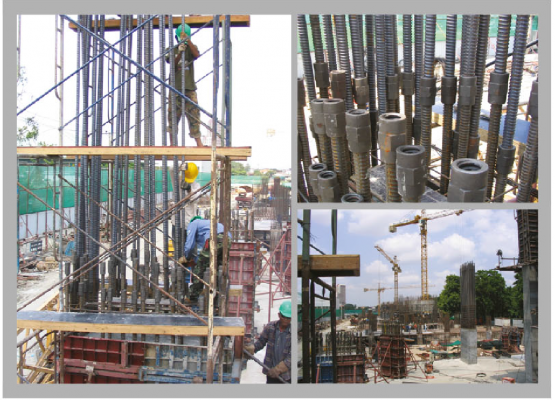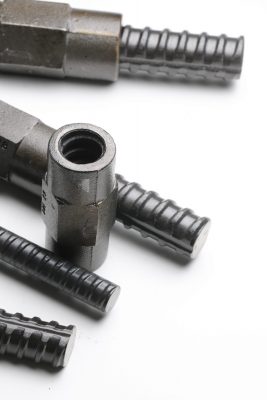WHAT IS ONE BAR?
One Bar is a steel bar with TIS.24 standard of SD40/SD50 grade and used in general reinforced concrete building construction. It has distinctive shape with threading formed thoroughly along the bar length which allows for perfect reinforcing bar (rebar) coupling.
In Thailand, construction of whatever building or infrastructures requires the use of rebar to fortify the concrete in tension. Thus, cutting and joining of the rebars has been common in construction works. There have been two conventional methods in placing reber to concrete: placing and tying with wire by human labor, and placing and welding with an arc welding machine. Both methods have caused high volume of waste because the rebar is required to be placed up to the bar length of 40 times the diameter length, hence high expenses on tying wire, welding rod and welding gas, as well as loss of steel strength at the joint.
With such weaknesses of the conventional method, a new rebar joining method has been introduced using the coupler, wich can be handle in two ways as below
- Having deformed ber transported directly to a workshop for the threading process:
By this method, the following shortcomings are noted:
- Customer cannot see the bar ordered from supplier, so being unable to check the quality and quantity of the pre-threaded bar.
- Increase in logistics costs due to double handling.
- Threading expense added and hidden in the coupler costs.
- With mixed bars from various projects at workshop, customer may fail to get the right finished product from workshop.
- In case where there is modification of construction design or change of rebar length, it will take a further period of time for threading before construction work can be resumed.
- Steel bar with inadequate roundness in cross section area will be poor for threading, hence less strength at the joint.
- There will be scrap incurred from round dies.

2. Having an outside company to handle the threading process at the work site:
By this approach, no double handling cost will be incurred, but a construction crane is required to move rebars for threading. The rebar not round enough will affect the thread strength. Costs and scraps are also incurred from round dies. Quality control will thus be a concern, especially as regards requirement to meet ISO 9000 certification.

MILL CONCEPT
From the above principle and rationale, MILL aims to develop thread rolling technology to generate rebars of SD40/ SD50 grade TIS standard, with threads thoroughly formed along the bar length so that coupling can be made at any point. Threading is accordingly not required elsewhere. Rebar connection can be made quickly and conveniently with time, space and cost saving. Such development will add value to the product, and assure customers of direct cost saving.

